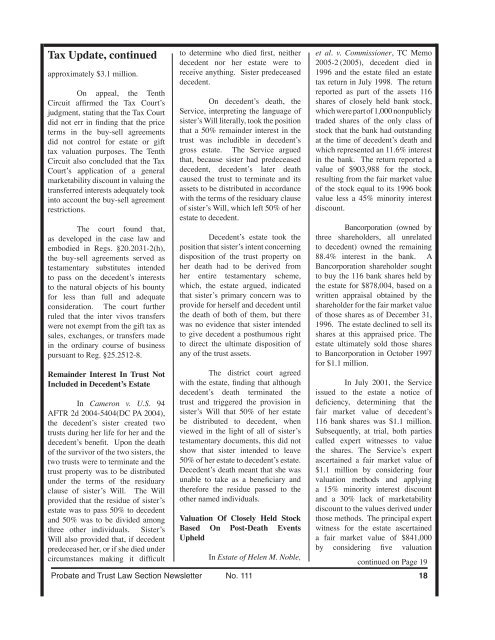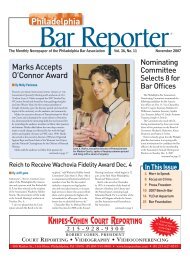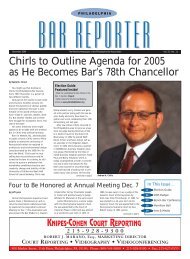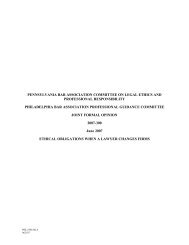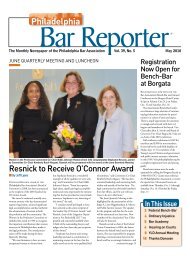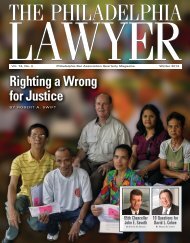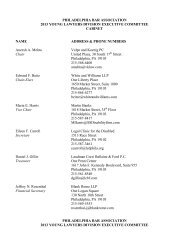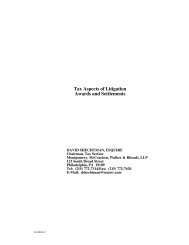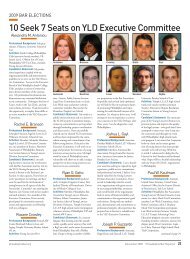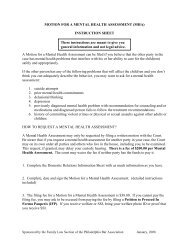Probate & Trust Newsletter: April 2005 - Philadelphia Bar Association
Probate & Trust Newsletter: April 2005 - Philadelphia Bar Association
Probate & Trust Newsletter: April 2005 - Philadelphia Bar Association
Create successful ePaper yourself
Turn your PDF publications into a flip-book with our unique Google optimized e-Paper software.
Tax Update, continued<br />
approximately $3.1 million.<br />
On appeal, the Tenth<br />
Circuit affirmed the Tax Courtʼs<br />
judgment, stating that the Tax Court<br />
did not err in finding that the price<br />
terms in the buy-sell agreements<br />
did not control for estate or gift<br />
tax valuation purposes. The Tenth<br />
Circuit also concluded that the Tax<br />
Courtʼs application of a general<br />
marketability discount in valuing the<br />
transferred interests adequately took<br />
into account the buy-sell agreement<br />
restrictions.<br />
The court found that,<br />
as developed in the case law and<br />
embodied in Regs. §20.2031-2(h),<br />
the buy-sell agreements served as<br />
testamentary substitutes intended<br />
to pass on the decedentʼs interests<br />
to the natural objects of his bounty<br />
for less than full and adequate<br />
consideration. The court further<br />
ruled that the inter vivos transfers<br />
were not exempt from the gift tax as<br />
sales, exchanges, or transfers made<br />
in the ordinary course of business<br />
pursuant to Reg. §25.2512-8.<br />
Remainder Interest In <strong>Trust</strong> Not<br />
Included in Decedentʼs Estate<br />
In Cameron v. U.S. 94<br />
AFTR 2d 2004-5404(DC PA 2004),<br />
the decedentʼs sister created two<br />
trusts during her life for her and the<br />
decedentʼs benefit. Upon the death<br />
of the survivor of the two sisters, the<br />
two trusts were to terminate and the<br />
trust property was to be distributed<br />
under the terms of the residuary<br />
clause of sisterʼs Will. The Will<br />
provided that the residue of sisterʼs<br />
estate was to pass 50% to decedent<br />
and 50% was to be divided among<br />
three other individuals. Sisterʼs<br />
Will also provided that, if decedent<br />
predeceased her, or if she died under<br />
circumstances making it difficult<br />
to determine who died first, neither<br />
decedent nor her estate were to<br />
receive anything. Sister predeceased<br />
decedent.<br />
On decedentʼs death, the<br />
Service, interpreting the language of<br />
sisterʼs Will literally, took the position<br />
that a 50% remainder interest in the<br />
trust was includible in decedentʼs<br />
gross estate. The Service argued<br />
that, because sister had predeceased<br />
decedent, decedentʼs later death<br />
caused the trust to terminate and its<br />
assets to be distributed in accordance<br />
with the terms of the residuary clause<br />
of sisterʼs Will, which left 50% of her<br />
estate to decedent.<br />
Decedentʼs estate took the<br />
position that sisterʼs intent concerning<br />
disposition of the trust property on<br />
her death had to be derived from<br />
her entire testamentary scheme,<br />
which, the estate argued, indicated<br />
that sisterʼs primary concern was to<br />
provide for herself and decedent until<br />
the death of both of them, but there<br />
was no evidence that sister intended<br />
to give decedent a posthumous right<br />
to direct the ultimate disposition of<br />
any of the trust assets.<br />
The district court agreed<br />
with the estate, finding that although<br />
decedentʼs death terminated the<br />
trust and triggered the provision in<br />
sisterʼs Will that 50% of her estate<br />
be distributed to decedent, when<br />
viewed in the light of all of sisterʼs<br />
testamentary documents, this did not<br />
show that sister intended to leave<br />
50% of her estate to decedentʼs estate.<br />
Decedentʼs death meant that she was<br />
unable to take as a beneficiary and<br />
therefore the residue passed to the<br />
other named individuals.<br />
Valuation Of Closely Held Stock<br />
Based On Post-Death Events<br />
Upheld<br />
In Estate of Helen M. Noble,<br />
et al. v. Commissioner, TC Memo<br />
<strong>2005</strong>-2 (<strong>2005</strong>), decedent died in<br />
1996 and the estate filed an estate<br />
tax return in July 1998. The return<br />
reported as part of the assets 116<br />
shares of closely held bank stock,<br />
which were part of 1,000 nonpublicly<br />
traded shares of the only class of<br />
stock that the bank had outstanding<br />
at the time of decedentʼs death and<br />
which represented an 11.6% interest<br />
in the bank. The return reported a<br />
value of $903,988 for the stock,<br />
resulting from the fair market value<br />
of the stock equal to its 1996 book<br />
value less a 45% minority interest<br />
discount.<br />
Bancorporation (owned by<br />
three shareholders, all unrelated<br />
to decedent) owned the remaining<br />
88.4% interest in the bank. A<br />
Bancorporation shareholder sought<br />
to buy the 116 bank shares held by<br />
the estate for $878,004, based on a<br />
written appraisal obtained by the<br />
shareholder for the fair market value<br />
of those shares as of December 31,<br />
1996. The estate declined to sell its<br />
shares at this appraised price. The<br />
estate ultimately sold those shares<br />
to Bancorporation in October 1997<br />
for $1.1 million.<br />
In July 2001, the Service<br />
issued to the estate a notice of<br />
deficiency, determining that the<br />
fair market value of decedentʼs<br />
116 bank shares was $1.1 million.<br />
Subsequently, at trial, both parties<br />
called expert witnesses to value<br />
the shares. The Serviceʼs expert<br />
ascertained a fair market value of<br />
$1.1 million by considering four<br />
valuation methods and applying<br />
a 15% minority interest discount<br />
and a 30% lack of marketability<br />
discount to the values derived under<br />
those methods. The principal expert<br />
witness for the estate ascertained<br />
a fair market value of $841,000<br />
by considering five valuation<br />
continued on Page 19<br />
<strong>Probate</strong> and <strong>Trust</strong> Law Section <strong>Newsletter</strong> No. 111 18


